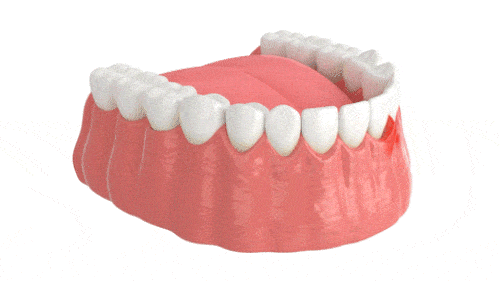Periodontal Treatment in Melbourne, FL
Providing Affordable and Effective Gum Disease Treatment Throughout Brevard County
In the US, nearly 50% of adults aged 30 and older have periodontal disease, and this number increases to 70% for the older adult population. Periodontal disease—also known as gum disease—is a bacterial infection that affects the gum tissue. Though its prevalence increases with age, anyone can get gum disease. The goal of periodontal treatment is to control the infection and prevent its progression to more problematic stages.
At Designing Smiles Dentistry, our team is well-equipped to detect early signs of periodontal disease and treat the infection. Whether you need a deep cleaning or corrective surgery, Dr. Apel and his team have the skill and experience to help you achieve optimal oral health.
Understanding Periodontal Disease
Poor oral hygiene is the main cause of periodontal disease due to plaque buildup. Plaque is a film that develops on your teeth throughout the day and contains bacteria. If it isn’t removed through consistent brushing and flossing, the plaque hardens to tartar, which can only be removed by a dentist. Tartar accumulation allows the bacteria to spread below the gumline, causing inflammation and infection.
When left untreated, the infection deteriorates the gums and jawbone. Fortunately, maintaining regular dental check-ups can prevent and control periodontal disease before it causes permanent damage.
Gum disease develops in 4 stages:
- Gingivitis: This is the earliest stage of gum disease, which is reversible with diligent oral hygiene. If you have gingivitis, you might notice red or swollen gums that may bleed when brushing or flossing. At this point, there is no bone loss.
- Mild periodontitis: When the infection spreads below the gums, the gums begin to recede, separating from the tooth. As a result, you may see a pocket forming between your tooth and gums. During this stage, the bone supporting the tooth begins to weaken.
- Moderate periodontitis: Left untreated, bacteria break down the bone, tissues, and ligaments. With moderate periodontitis, you may experience pain, develop bad breath, or notice pus at the gum line.
- Advanced periodontitis: The most advanced stage of periodontal disease is characterized by extensive bone and tissue loss, causing the tooth to loosen and fall out. In some cases, we may need to extract the tooth to halt the spread of infection.
Periodontal disease is the leading cause of tooth loss. Left untreated for too long, you won’t just lose the tooth—you will also lose valuable bone that could have been used for dental implants.
Warning Signs
During your routine dental check-ups, we will examine your teeth and gums for warning signs of gum disease. However, you may first experience symptoms at home, such as:
- Bad breath or an unpleasant taste
- Loose teeth
- Sensitive teeth
- Red or purple gums
- Swollen, tender, or bleeding gums
- Receding gums
- Pain or soreness when chewing
You may also notice that your teeth do not fit together properly when you bite. If you wear partial dentures, you may detect a change in the fit.
Risk Factors
Inadequate oral hygiene is the leading cause of gum disease, primarily due to infrequent brushing and flossing or improper technique. However, certain conditions or lifestyle choices can also impact how your immune system responds to bacteria, increasing your risk.
Gum disease risk factors include:
- Smoking, vaping, or chewing tobacco
- Obesity
- Stress
- Poor nutrition, especially a diet high in sugar and saturated fat
- Misaligned teeth, which make brushing and flossing difficult
- Heart disease
- Diabetes
- Poor nutrition
- Genetics
- Medications that cause dry mouth
- Autoimmune diseases
- Hormonal changes in women
Some individuals are genetically predisposed to developing periodontal disease. If a family member has gum disease, you are more likely to experience it yourself.
Prevention Measures
Gum disease is preventable and, in its early stages, reversible. On the other hand, advanced periodontal disease can wreak havoc on your teeth, gums, and bone, leading to long-term issues. For example, gum disease has been linked to serious health issues like respiratory disease, heart disease, and stroke. That’s why good oral hygiene is crucial.
At home, regular brushing with fluoride toothpaste, flossing daily to remove plaque between teeth, and using an antiseptic mouthwash can prevent plaque buildup. Other behaviors, like stopping tobacco use, reducing sugar intake, and limiting alcohol, can also reduce your risk of developing gum disease.
In addition to the measures you can take on a daily basis, routine dental check-ups and professional cleanings are essential for early detection and treatment. Following Dr. Apel’s recommendations for improved home care and maintaining a consistent oral hygiene routine will help you manage and prevent the recurrence of gingivitis.
Periodontal Treatment Options
At Designing Smiles Dentistry, we provide various non-surgical and surgical treatments for periodontal disease, depending on the extent of infection. At your free consultation, we will evaluate the health of your teeth, gums, and jaw by examining your mouth for plaque and tartar accumulation, measuring the depth of pockets between your teeth and gums, and taking X-rays to assess bone loss. The information we gather helps us determine which procedures best address your needs.
Non-surgical Periodontal Treatment
Non-surgical treatments for periodontal disease are crucial for managing and stalling its progression. Scaling and root planing is a non-invasive procedure that deep cleans your teeth and gums. This treatment typically takes at least two visits and is performed with local anesthesia. During scaling, Dr. Apel will carefully remove plaque and tartar deposits from above and below the gumline using specialized instruments. Root planing involves smoothing the tooth’s root surfaces to discourage future bacterial attachment and promote gum tissue reattachment. This procedure helps eliminate infection and inflammation.
Medications such as antibiotics may also be prescribed to further combat bacteria and reduce inflammation. Non-surgical treatments are typically the first line of defense against periodontal disease. When combined with improved home care practices, they can effectively manage the condition and prevent it from advancing to more severe stages requiring surgical intervention. Regular follow-up appointments and maintenance cleanings are essential to monitor progress and maintain oral health.
Surgical Periodontal Treatment
Surgical treatments are needed for advanced cases of periodontal disease when non-surgical options are insufficient. To address bone loss, Dr. Apel can perform a bone grafting procedure, placing graft material on areas where the bone has eroded. This allows your body to regenerate the lost bone. For receding gums, Dr. Apel can perform gum graft surgery, using tissue from the roof of your mouth or a tissue bank to add thickness to your gums. Both grafting procedures promote better stability for teeth and can repair damage caused by periodontal disease.
Another surgical treatment is flap surgery, which reduces the pockets formed when the gums pull away from the tooth. For this procedure, Dr. Apel will make an incision and lift the gum tissue to access the roots of your teeth. This allows him to remove tartar from deep pockets that have formed between the teeth and gums. After cleaning, Dr. Apel will reposition the gums and suture the incision, decreasing the pocket depth.
These surgical treatments help restore the supporting structures of the teeth, prevent tooth loss, and improve oral health.
When Gum Disease Leads to Tooth Loss
When the infection leads to advanced periodontitis, tooth loss is likely. Unfortunately, losing even a single tooth can significantly impact your oral health and well-being.
Thanks to advancements in dentistry, many tooth replacement options are available to restore function to your smile. Mini dental implants, in particular, offer a secure and long-lasting solution for replacing missing teeth. Because they are half the size of traditional dental implants, mini implants are ideal for those with bone loss. These prosthetic tooth roots are implanted into your jawbone to support a restoration like an artificial crown, bridge, or denture. Unlike other tooth replacement options, dental implants preserve the health of your jawbone by giving it the stimulation it needs to remain strong.
Designing Smiles Dentistry is a Mini Dental Implant Center of America, providing innovative and proven tooth replacement solutions. Dr. Apel is an expert implant dentist with extensive experience placing mini implants.
Periodontal Treatment at Designing Smiles Dentistry
Gum disease is a common but concerning oral health issue. At Designing Smiles Dentistry, our aim is to detect and control early-stage gum disease. From routine maintenance and deep cleanings to non-surgical and surgical periodontal treatments, we help you prevent gum disease from advancing to more serious stages.
However, if you have lost one tooth or many due to gum disease, we can help. As a leader in implant dentistry, Dr. Apel uses revolutionary mini dental implants to help you feel like you again.
Don’t wait to begin your journey toward optimal oral health. Contact us today for a free periodontal treatment consultation.

